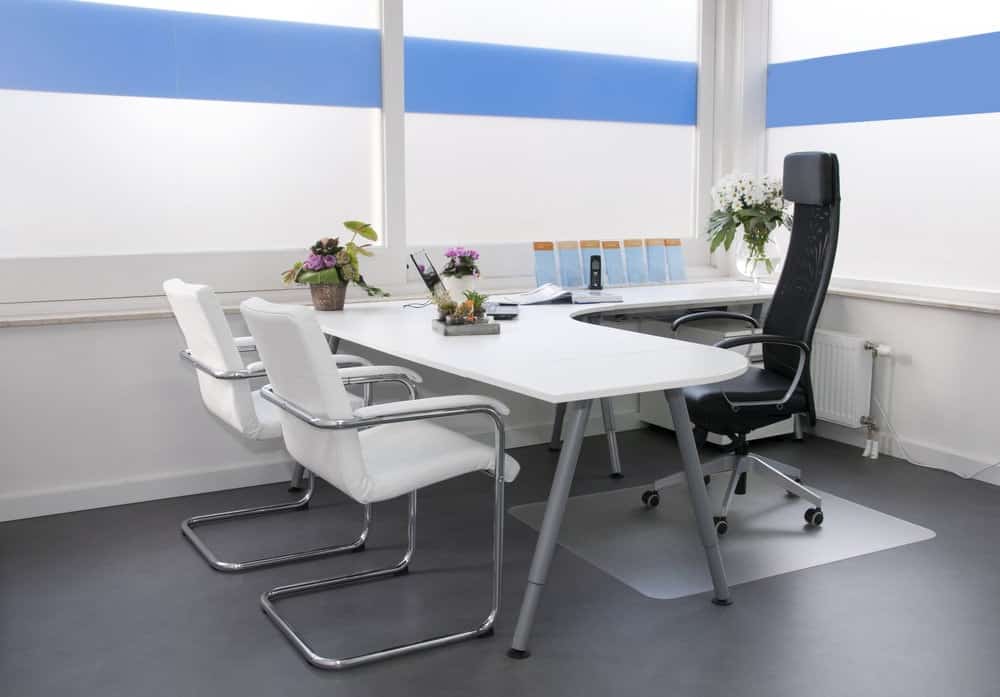Buying something that breaks down before it expires is annoying. It is also heartbreaking because it leaves your wallet a few dollars lighter after you buy a replacement.
This is the story for many people who buy chair mats that keep cracking during use. So you might be asking yourself, “why does my chair mat keep cracking?”
Most chair mats crack because they are made of cheap materials that break down after a period of time.
It’s important to remember that poor materials are not the only reason chair mats crack. Even chair mats made of stronger, more durable materials can crack.
In this article, we look at the reasons why your chair mats keep cracking, how to stop your chair mat from cracking, and if an indestructible chair mat exists.
Table of Contents
What is a Chair Mat?

A chair mat is a flat piece of furniture placed on the floor that acts as a buffer between your chair and your floor. It can either be flexible or stiff depending upon the materials used to make it. For example, a glass chair mat is rigid, while a vinyl mat is soft and flexible.
Below, we’ve listed reasons why people typically use chair mats.
- Chair mats protect floors from wear and tear.
- They enable smoother rolling for their office chairs.
- Mats protect their floors from spills and scuffs.
- They create a more comfortable floor surface during their work.
Why Do Chair Mats Crack?
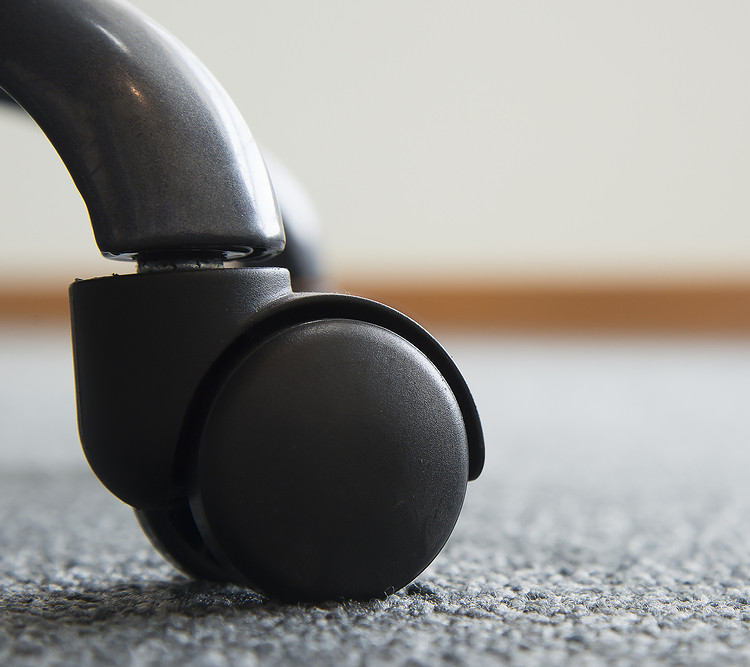
Chair mats crack for various reasons. While some causes like normal wear and tear are unavoidable, chair mats can also crack because of carelessness, ignorance, or incorrect use.
Here are some common causes behind a cracking chair mat:
Poor Construction Material
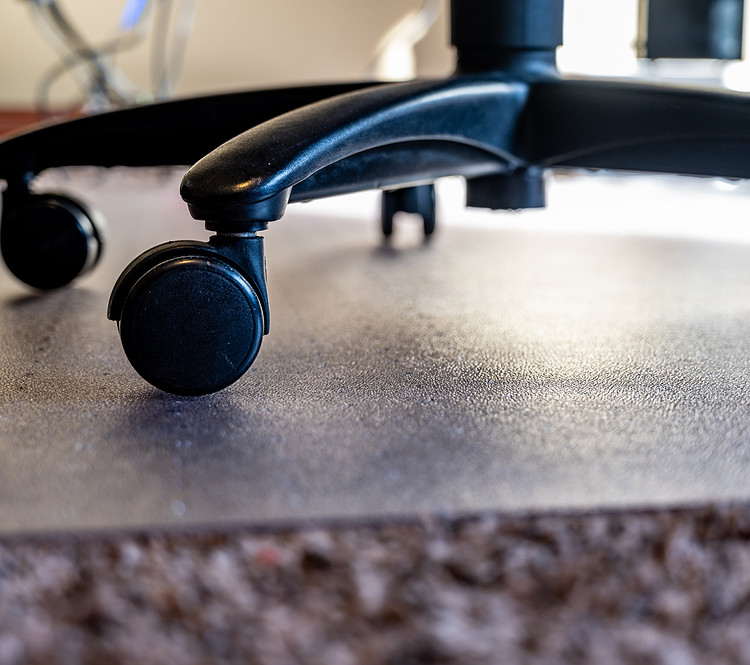
Most chair mats made of vinyl, also known as Polyvinyl Chloride (PVC), have a short lifespan. They have a short lifespan because the plasticizers that make vinyl flexible will dry out over time.
As a result, your vinyl chair mat will become more brittle and easy to crack as it loses its flexibility.
Bad Floor Surface
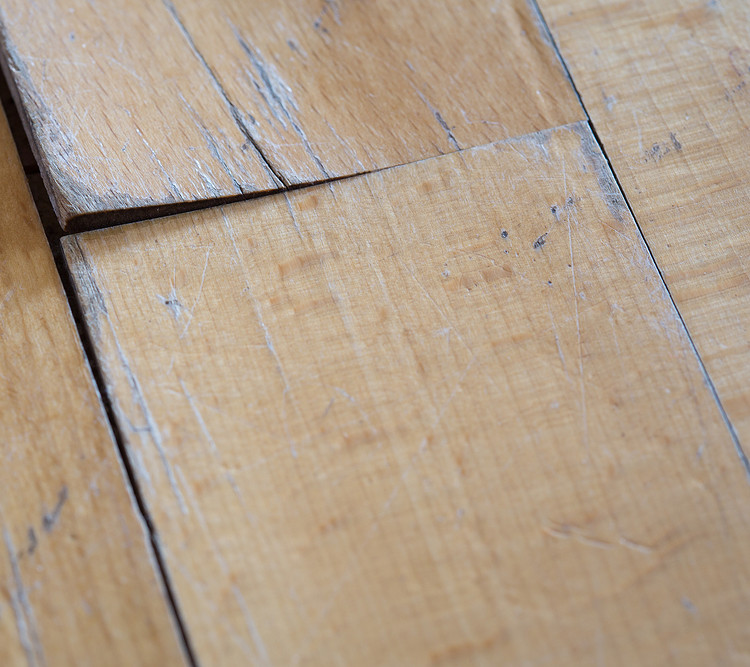
Soft floors like carpets give chair mats more room to flex, bend, and stretch. As a result, any chair mat used on a soft floor experiences more stress than a chair mat placed on a solid floor like hardwood.
So if your floor is soft, slippery, or uneven, it will be easier for your chair mat to crack.
Incorrect Floor and Chair Mat Combination
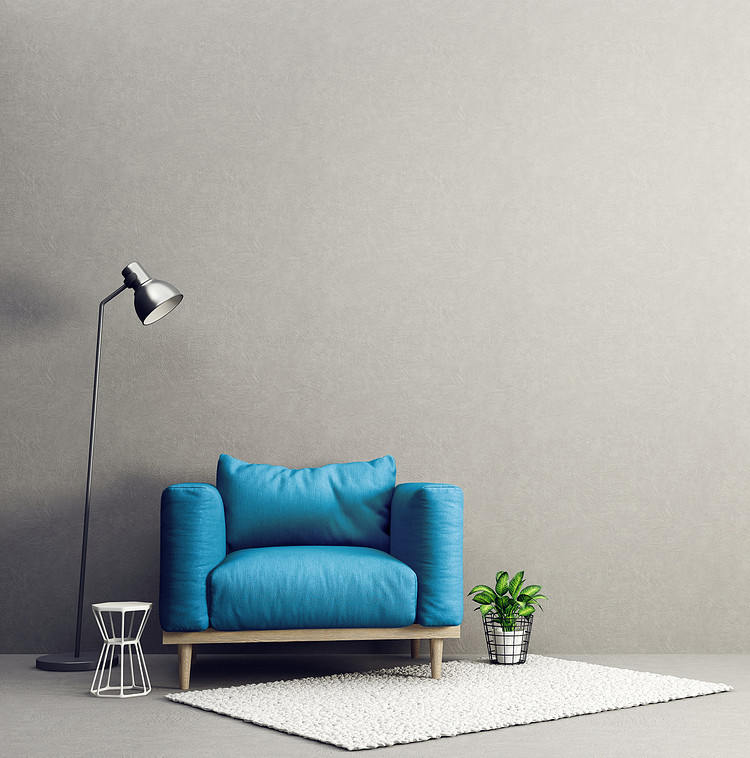
Different chair mats are created for different floor types.
So you shouldn’t use chair mats designed for hard floors on carpets. Otherwise, your mat will slide a lot, which will speed up the cracking process.
Similarly, if you use a chair mat with tiny pins on the back designed for carpets on hard floors, you will have the same problem. Your chair mat will experience extra flex and stress from the protruding pins, which will cause it to crack faster.
Therefore, you should make sure you pick the right mat for your floor type.
Damaging Chair Wheels
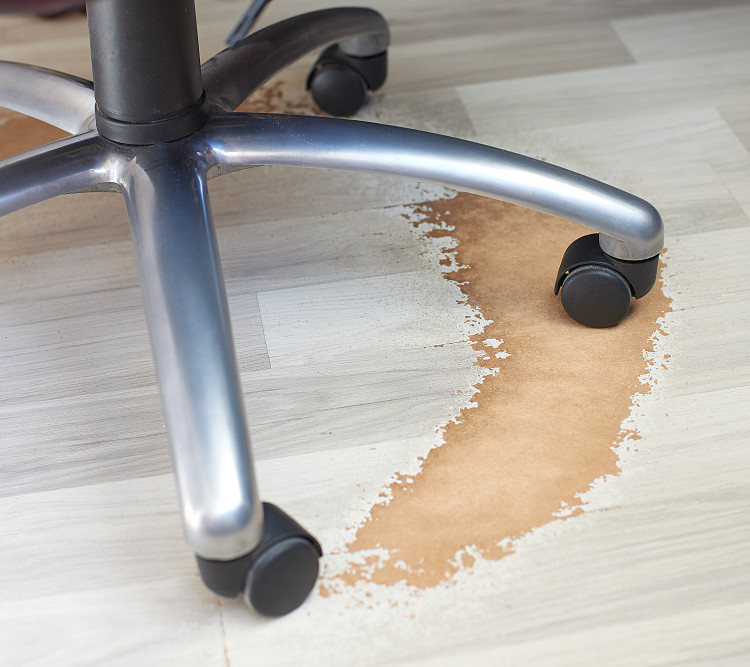
Some office chairs have caster wheels that are unsuitable for chair mats. Try to avoid using wheels that are:
- Made of sharp plastic
- Pinch your floor mat
- Tenacious that sticks to your mat
- Too slick for your mat
Instead, try to pick a chair mat that’s suitable for your chair’s caster wheels. If that’s not an option, buy replacement wheels to match your desired chair mat.
As a rule of thumb, select a hard chair mat (e.g., glass) if your caster wheels are soft. If your wheels are hard, choose a soft, flexible chair mat.
If you fail to choose the right wheels to mat combination, you could damage your chair and mat, or hurt yourself. So for the best results, avoid using hard wheels on a hard mat or soft wheels on a soft mat.
Excessive or Careless Use
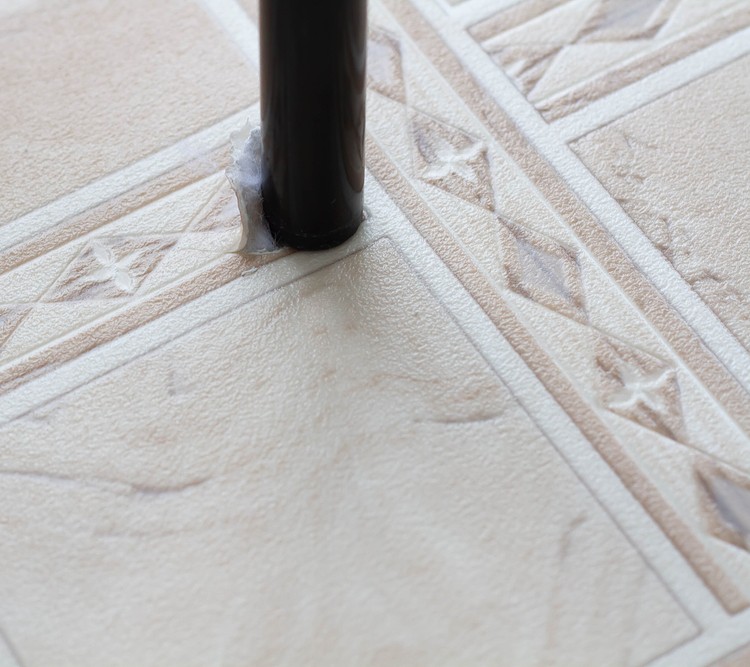
It’s a common mistake to assume that if a chair mat looks rough and tough, it’s also made of strong material.
People who make this assumption may mistreat their chair by performing actions like:
- Throwing themselves into the chair
- Sliding too fast and pushing too hard
- Wearing unsuitable shoes
- Placing other furniture on the mat
These actions can damage a chair mat and cause it to crack faster. So if you want to keep your chair mat for a long time, treat it well and avoid actions that can cause damage to your chair mat.
Insufficient Chair Mat Thickness
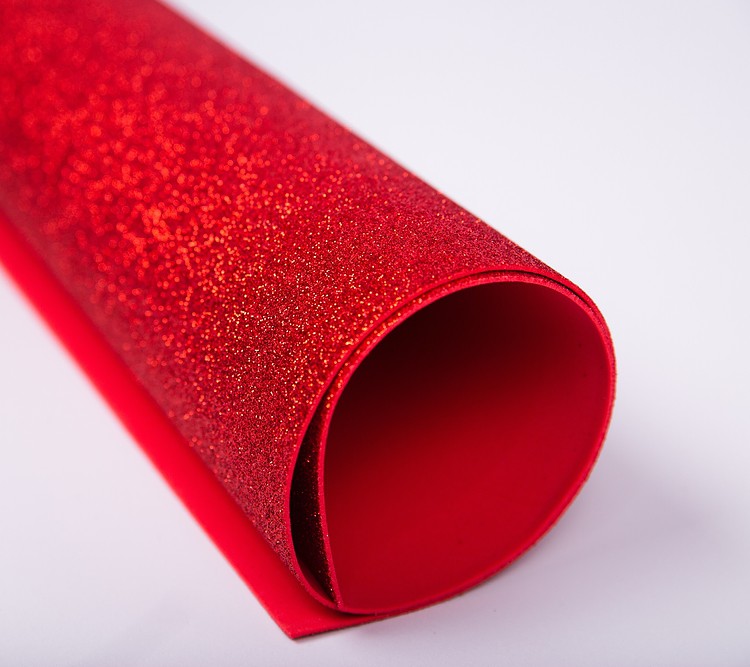
Using a chair mat with a less than suitable thickness for your floor type is a big mistake. If you have done this in the past, you know you’re on your way to buying a new mat.
A hard, inflexible, and thin chair mat is easier to crack because it’s unable to distribute your weight as effectively. If used on the wrong floor type, a thin chair mat will either crack or transfer the damage to your floor.
How Do I Keep My Chair Mat From Cracking?

Here’s how you can keep your chair from cracking:
- Buy a chair mat suited to your floor type. For example, buy a chair mat for soft floors to use on carpets and a chair mat for hard floors to use on tile.
- Buy a chair mat that’s suited to the thickness of your carpet. For carpets more than an inch thick, you need a chair mat that’s over ¾” thick.
- Place a solid surface under your chair mat. Place a ¼ inch thick plywood board under your mat.
- Change your chair’s wheels to match your type of chair mat. For example, use hard wheels on soft mats.
- Avoid throwing yourself into your chair mat or rolling too aggressively.
- Wear shoes that are suitable for use on chair mats. Stay away from high heels, as some of them can be sharp enough to pierce through your mat.
- Buy a high-quality chair mat made of more durable materials like polyethylene instead of PVC (vinyl).
- Avoid placing other furniture on top of your mat as it’s designed only to support you and your chair.
- Avoid dropping heavy objects onto your mat.
How Thick Should My Chair Mat Be?
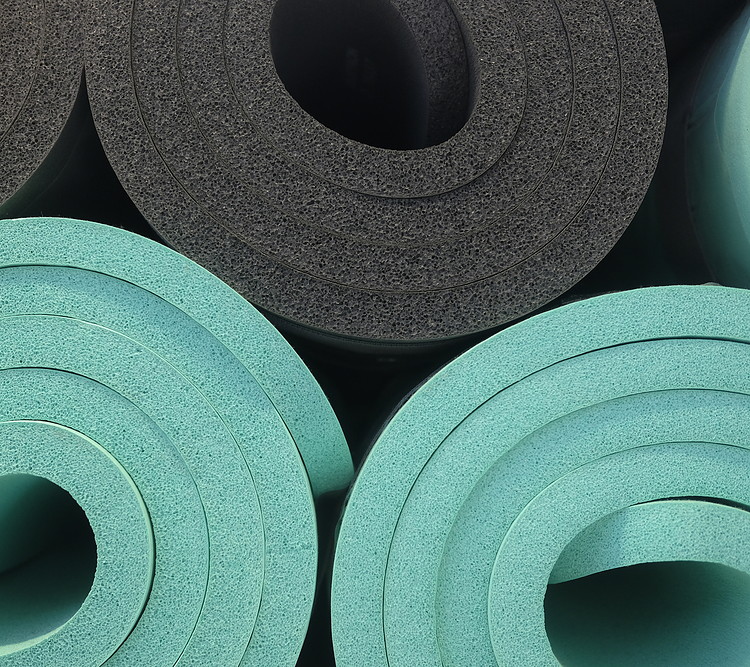
Choosing a chair mat with a thickness suitable for your floor type is key. If you choose a mat that is not thick enough, you will be disappointed when it cracks soon after buying it.
You should choose your mat’s thickness after considering your floor type. As a rule, softer floors need thicker mats. So as the thickness or pile of your carpet increases, so should the thickness of your chair mat.
How to Measure the Thickness of Your Carpet or Floor?
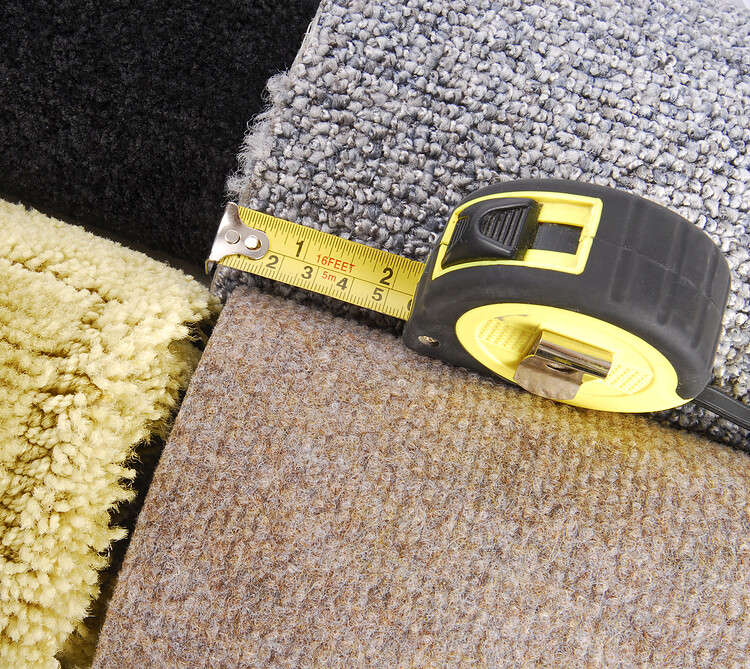
You don’t need to measure the thickness of hard floors because the load-bearing surface is on top.
To measure the thickness of your carpet, you need to:
- Get a pin, needle, or a straightened paper clip you can use to poke into the floor.
- Poke the pin or needle into the floor until you hit a hard surface.
- After you reach the ground, grab your needle, pin, or clip at the point flush with the top of your carpet.
- Measure the distance from your grabbed point to the sharp end.
- Use this floor thickness measurement to decide what mat thickness you need.
Here’s a table you can use to help you choose a mat thickness.
| Type of Floor | Thickness of Floor | Thickness of Chair mat |
| Hard Floor | Nil | ⅛” thick chair mat. Make sure there are no bottom cleats that will wear away the finish on your floor. |
| Low Pile | ¼” thick | ¼” thick chair mat. |
| Medium Pile | ¾” thick | ¾” thick chair mat or less. |
| Plush Pile | Over ¾” thickness. | Over ¾” thick chair mat. |
Is There a Chair Mat That Won’t Crack?

Yes, chair mats that won’t crack exist.
With that said, non-cracking chair mats may be more expensive and harder to find.
An excellent place to start searching for chair mats that won’t crack is searching for more expensive mats made of more robust materials like polycarbonate , tempered glass , and other special materials .
You can also build a custom DIY chair mat that won’t crack using materials like plywood or masonite from your local hardware store. If interested, check out this youtube video from AmplifyDIY on how to make a DIY chair mat.
Building a DIY mat can turn out to be far cheaper than buying a ready-made chair mat.
Conclusion
In summary, if you want your chair mat to last a long time, you should try to buy one made of stronger materials. If possible, avoid buying vinyl mats that are cheap but start to crack as soon as the plasticizers evaporate.
If you have a carpet under your desk, try to measure your carpet’s thickness before you buy a chair mat. You can use this measurement to find the ideal chair mat with the right thickness for your carpet.
It’s also important to use the right chair mat on the right type of floor for the best results. Failure to do so can have undesirable results.

My name is Vance, and I am the owner of To Ergonomics. Our mission is to improve your workflow by helping you create a supportive and welcoming environment. We hope that you’ll find what you’re looking for while you’re here.

